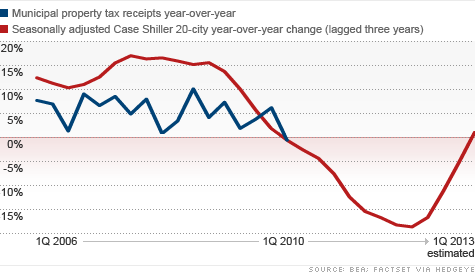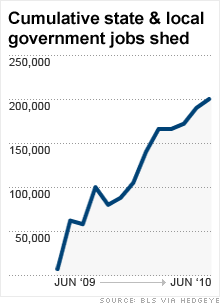
FORTUNE -- State and local governments are facing a vicious cycle thanks to our financial crisis. Since home prices haven't really recovered, tax revenues are down. Since tax revenues are down, governments are cutting jobs, which means cutting services to homeowners. That means governments are spending less money in their communities, and employing less people, perpetuating the decline in property values that caused tax revenues to decrease in the first place.
Indeed, the first sentence of the executive summary of the latest National Association of State Budget Officers (NASBO) Fiscal Survey of State Budgets reads: "Fiscal 2010 presented the most difficult challenge for States' financial management since the Great Depression and fiscal 2011 is expected to present states with similar challenges."

The reason many (if not all) states around the country have such long faces are because they have to do just the opposite with their budgets: shorten them up. As mandated by federal law, every state except Vermont is required to balance its budget.
But sales tax, personal income tax, and corporate income tax (by itself 80% of states' general fund revenue) revenues have fallen off a cliff. As a result, states and municipalities have had to take very drastic measures -- including laying off over 200,000 state and local government employees since June 2009, as the chart at left shows. (Job losses will be over a million, but we'll get to that later.)
The pain is likely to intensify: states facing a $140 billion budget gap in fiscal 2011, according to the Center of Budget and Policy Priorities.
And it gets worse: federal stimulus is expected to fall by $55 billion next year.
But the piling on isn't over: recently, the Senate failed to pass a measure to provide States $16 billion for extra Medicaid funding.
State governments have also already spent 89% of their American Recovery and Reinvestment Act of 2009 (stimulus) funds.To provide an idea of how important that money was, it accounted 30% of state spending in 2010.
State taxes likely must rise to keep up with spending
Despite all this bad news, governors' recommended budgets cumulatively imply a 3.7% year over year increase in spending. By law, that spending increase has to come from a similar increase in tax receipts for 2011.
It's worth noting here that tax collections declined 2.3% from 2009 to 2010, so the numbers aren't as bad as they sound. But, 2011 budgets still suggest that tax receipts will be 0.8% higher than they were two years ago. And it's unclear where that tax money will come from.
An increase of any size seems optimistic based on current trends of state level personal income taxes. As in, the country still has 9.5% unemployment, and jobless claims hovering well above 400,000 per week.
Perhaps that's why fiscal 2010 revenue collection from sales, personal income taxes, and corporate income taxes are below original projections in 46 states. That trend will continue in fiscal year 2011 if growth slows down or the federal government stops spending during the later half of fiscal year 2010.
Local governments: better able to adjust, but only for now
Luckily for local governments, which have been feeling the negative effects of state budget balancing, home appraisals for municipal property tax collection (roughly 35% of local government revenue) lag market prices by 2-3 years, as the chart at the top shows.
As a result, property tax revenues have been positive throughout the housing downturn. But, that lag exists not just for high home prices, but low ones.
Recent data shows that for the first quarter of this year, property tax receipts declined compared to last year, something that hasn't happened 2003. Local government tax receipts -- especially when factoring in our bearish outlook for housing prices in the next 12-18 months, are going to plummet.
As bad as that is for local governments, consumers will feel the hit twice: as their home values fall, governments will have to hike tax rates themselves to boost revenue from the lower assessments. Local governments will need to do this just to hold revenues, and budgets, where they are right now.
All this strain on state and local government budgets will have a negative effect on the U.S. economy at large. Job cuts at the state and municipality level are affecting all areas of the economy -- from public transportation to private companies that work with state governments.
About those million-plus lost jobs? Research from the Center on Budget and Policy Priorities suggests that a total of 900,000 private sector jobs (on top of the 200,000 state and local jobs already shed) could be lost as a result of state and local government cost shedding.
Further job losses will make it even more difficult for state and local governments to meet revenue estimates and -- well, it's the vicious cycle this article began with.
-- Darius Dale is an analyst at Hedgeye, a research firm based in New Haven, Conn. ![]()






| Company | Price | Change | % Change |
|---|---|---|---|
| Ford Motor Co | 8.29 | 0.05 | 0.61% |
| Advanced Micro Devic... | 54.59 | 0.70 | 1.30% |
| Cisco Systems Inc | 47.49 | -2.44 | -4.89% |
| General Electric Co | 13.00 | -0.16 | -1.22% |
| Kraft Heinz Co | 27.84 | -2.20 | -7.32% |
| Index | Last | Change | % Change |
|---|---|---|---|
| Dow | 32,627.97 | -234.33 | -0.71% |
| Nasdaq | 13,215.24 | 99.07 | 0.76% |
| S&P 500 | 3,913.10 | -2.36 | -0.06% |
| Treasuries | 1.73 | 0.00 | 0.12% |
|
Bankrupt toy retailer tells bankruptcy court it is looking at possibly reviving the Toys 'R' Us and Babies 'R' Us brands. More |
Land O'Lakes CEO Beth Ford charts her career path, from her first job to becoming the first openly gay CEO at a Fortune 500 company in an interview with CNN's Boss Files. More |
Honda and General Motors are creating a new generation of fully autonomous vehicles. More |
In 1998, Ntsiki Biyela won a scholarship to study wine making. Now she's about to launch her own brand. More |
Whether you hedge inflation or look for a return that outpaces inflation, here's how to prepare. More |